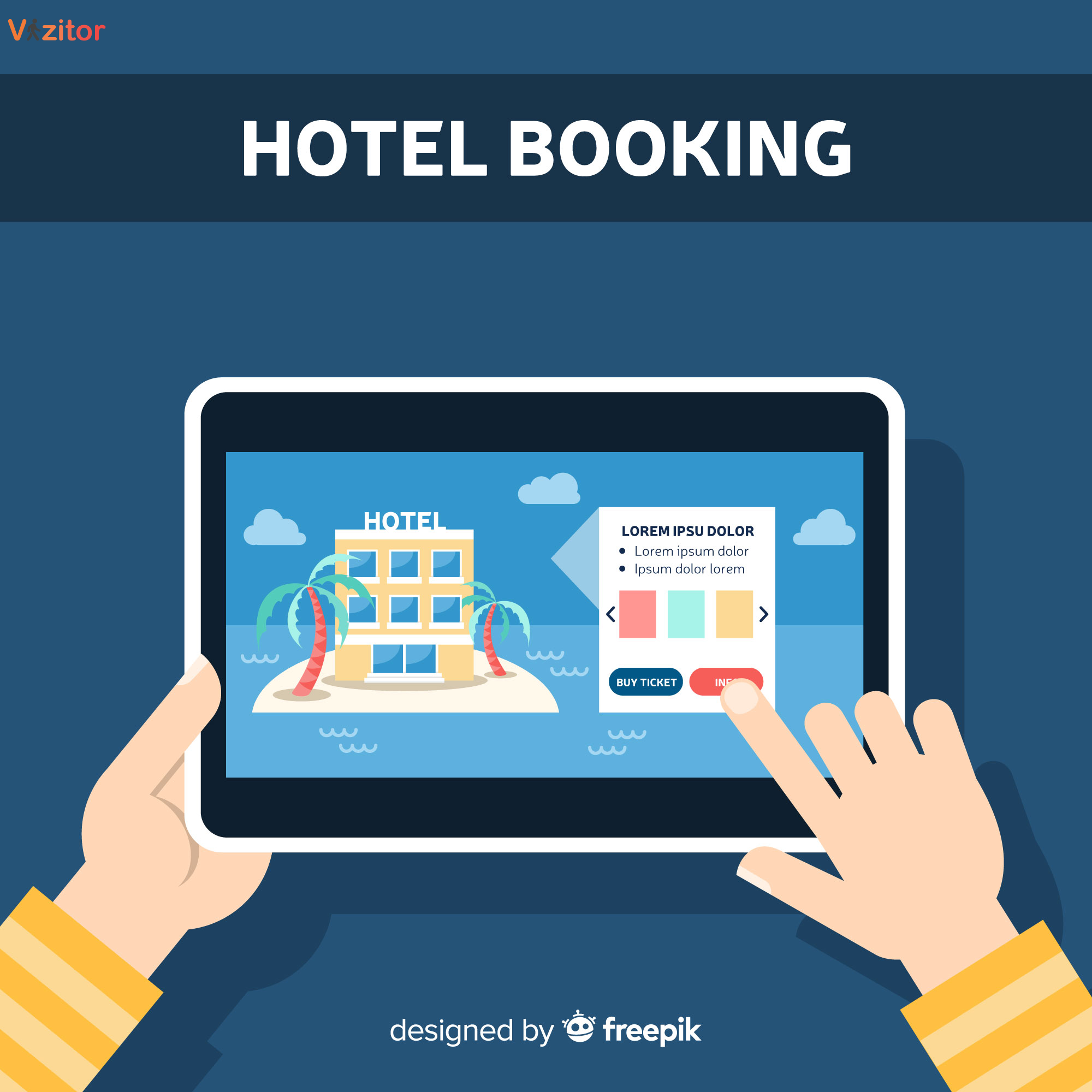Table of Content
Try Vizitor for Free!

Mon, Mar 31, 2025
Read in 12 minutes
Have you ever arrived at a hotel after a long journey and faced long check-in lines, outdated print signs, or unclear directions?
Now imagine being greeted by a vibrant digital signage screen in the lobby. It welcomes you by name, shows your check-in status, points you to your room, and displays dining offers or events—all in real time.
This is no longer futuristic. It’s happening now, and in 2025, digital signage for hotels will become a must-have solution for enhancing guest satisfaction, streamlining operations, and keeping properties competitive.
Let’s explore why digital signage in hotels is more than just a screen—it’s a guest experience upgrade.
What is Digital Signage?
Digital signage refers to electronic displays used to communicate information dynamically.
In hotels, it’s much more than just a screen; it’s an interactive tool to enhance guest engagement, provide real-time updates, and promote services.
How It Works in Hotels:
- Displays event schedules, room availability, or special offers.
- Integrates with queue management systems like Vizitor to reduce wait times.
- Offers personalized experiences through touchscreens or smart integrations.
- Update displays automatically for real-time details such as room availability, events, or weather forecasts
While digital signage and queue management systems bring numerous benefits to hotels, the implementation and seamless integration of these technologies come with their own set of challenges.
Studies show that hotels with digital signage systems see up to 40% faster check-in times.
Also read: Improve queue management with digital signage solutions
Common Challenges faced by Hospitality Industries:
Let’s explore some of the common obstacles hotels face :
1. Managing Guest Expectations and Wait Times
One of the primary challenges hotels face in queue management is handling guest expectations when it comes to wait times. Guests expect quick service, but during peak check-in times, queues can become unavoidable.
Long wait times lead to guest frustration, and if not managed properly, this can negatively affect the overall guest experience.
2. Inefficient Use of Space
In hotels, space is often limited, and poor queue management can lead to congestion in high-traffic areas, such as the lobby or reception. Long lines can create a sense of chaos, affecting both the guest experience and the hotel’s overall ambiance.
Long queues in confined spaces can lead to overcrowding and inefficient use of the available space.
Also explore: The Ultimate Guide to Office Space Management
3. Lack of Integration Between Systems
Many hotels rely on a disjointed combination of traditional systems like paper-based queue solutions or manual check-ins alongside digital signage.
This lack of integration can lead to errors, miscommunication, and inconsistent information being displayed to guests.
Studies show that a leading hotel chain integrated digital signage to showcase daily specials and offer discounts. They reported a 15% boost in restaurant sales due to more effective marketing through signage.
4. Space Management and Flow
Poor space management can exacerbate other issues, such as long queues and crowded areas. If guests are forced to wait in poorly designed spaces, it can feel uncomfortable or overwhelming.
Poor flow through the hotel’s common areas can create negative impressions, affecting guest satisfaction, and leading to a less pleasant experience.
5. Engaging Guests with Information
Keeping guests informed and engaged in a modern and interactive way is a challenge. Generic, static signage or flyers can feel outdated, and guests may miss important details like event schedules, amenities, or promotions.
A lack of engaging, relevant, and timely communication can lead to guests missing out on hotel offerings and services that could enhance their experience.
6. Crowded Lobby Spaces
Hotel lobbies are often the first point of contact for guests, but they can quickly become congested, especially when queues form at check-in desks or popular service areas.
Overcrowded areas can make guests feel uncomfortable, leading to a chaotic atmosphere that impacts the overall guest experience.
Also read: What are Quick Serve Restaurants? Tips for enhancing Customer Service
By addressing these challenges with the right technologies, such as integrated queue management systems and digital signage solutions like Vizitor, hotels can create more streamlined, efficient, and guest-friendly experiences that improve satisfaction and operational efficiency.
Why Digital Signage for Hotels is must-have in 2025

In 2025, digital signage will become an essential tool for hotels aiming to streamline operations, enhance guest experience, and stay competitive in the fast-evolving hospitality industry.
As guests seek more efficient, personalized, and engaging services, digital signage offers hotels a powerful way to meet these demands.
Here are some key reasons why digital signage is a must-have in 2025:
1. Efficient Queue Management for Smooth Guest Flow
Guests often face long wait times, especially during check-ins, check-outs, or at service counters such as concierge or restaurant reservations.
Digital signage plays a key role in queue management by displaying real-time updates, keeping guests informed about their position in line, and helping reduce frustration.
A 2023 survey by Digital Signage Today reported that 65% of hotels using digital signage saw a noticeable reduction in wait times, enhancing guest satisfaction.
Major hotel chains like Marriott and Hilton use digital signage to show guests their position in line, improving check-in processes and enhancing the guest experience.
Also read: Things to consider while choosing Queue Management Software in 2025
2. Improved Guest Engagement and Communication
Digital signage for hotels allows them to deliver dynamic content such as hotel services, promotions, event updates, and emergency information.
This keeps guests engaged and informed while they wait or navigate the property.
According to Nielsen, 64% of guests are more likely to interact with digital signage content, such as special offers and event notifications, leading to increased guest engagement.
Hotel The Westin uses digital signage in lobbies to display personalized offers, local attractions, and event schedules, enhancing the guest experience.
3.Optimized Space and Guest Flow Management
In crowded areas like hotel lobbies or conference spaces, managing the flow of guests is crucial to ensuring a smooth and pleasant experience.
Hotels in high-traffic locations like The Venetian Resort in Las Vegas use digital signage to manage crowd flow during events and busy check-in periods.
Digital signage allows hotels to direct guests to less crowded areas, guide them through the property, and display important information in real-time.
4.Cost-Effective and Scalable Communication
Digital signage offers a cost-effective alternative to traditional print signage. Hotels can easily update content in real-time without the need for reprints or physical changes.
This not only saves money but also allows for more targeted, up-to-date communication.
Forrester Research found that businesses that switched from print to digital signage saw a 30% reduction in marketing and communication costs over two years.
5.Increased Operational Efficiency
With digital signage, hotel staff can focus on providing personal service, while digital displays take care of routine communications, such as check-in details, wait times, and event information.
This results in improved operational efficiency and more productive staff.
6.Supporting Health and Safety Compliance
In light of recent global events, hotels have had to adapt to changing health and safety guidelines.
Digital signage plays a key role in communicating real-time health and safety information to guests, such as COVID-19 protocols, social distancing guidelines, and hygiene practices.
This ensures that guests feel safe and well-informed, enhancing their trust in the hotel’s commitment to their well-being.
Hospitality Net reported that 74% of travelers believe health and safety information should be clearly displayed in public spaces, including hotels.
7.Building Customer Loyalty with Enhanced Experiences
Hotels can use digital signage to build customer loyalty by consistently enhancing the guest experience.
By displaying personalized messages, offers, and even loyalty program benefits on digital screens, hotels can create a deeper connection with guests, encouraging repeat visits.
Also read: Customer Service Automation: How can Your Workplace benefit
How Hotels Can Use Digital Signage Effectively
1. Hotel Lobbies: First Impressions Matter
- Greet guests with personalized messages.
- Display wayfinding maps or event details.
- Promote special offers like “Dinner for Two” at the hotel’s rooftop restaurant.
2. Restaurants and Cafes: Tempt the Taste Buds
- Showcase menu specials and chef’s recommendations.
- Integrate live feedback screens for diners.
3. Meeting Rooms and Events: Keep Guests Informed
- Display event schedules and room availability in real-time.
- Use signage for corporate branding during conferences.
What Are the Benefits of Digital Signage in Hotels?
In today’s competitive hospitality industry, hotel digital signage is more than a convenience—it’s a strategic tool for elevating guest experiences and operational efficiency.
Here are some key benefits of digital signage in hotels:
- Real-Time Communication: Instantly update guests on room availability, dining offers, or event changes.
- Cost Efficiency: Eliminate printing costs and reduce the time spent manually updating content.
- Improved Navigation: Use interactive hospitality digital signage to direct guests to elevators, meeting rooms, or spa facilities.
- Upselling Opportunities: Promote on-site services like spa packages, restaurant deals, or loyalty program offers.
- Brand Perception: Modern, sleek displays help position your hotel as tech-forward and guest-centric.
Hotels adopting digital signage hospitality industry standards are seeing significant ROI in both guest satisfaction and operational savings.
Digital Signage: Enhancing Hotel Check-in Experience
In hotels, the check-in process can be a bottleneck for guests, especially during peak hours.
Digital signage can simplify and speed up check-ins by displaying real-time information about the check-in process, wait times, and available services.
How It Helps: Digital signage can direct guests to self-check-in kiosks, reducing wait times and improving guest flow.
Top tips for Maximizing the Impact of Digital Signage
1. Keep Content Fresh
- Update your displays regularly with real-time information like room availability, local events, and promotions.
- Tip: Use content management software for automatic updates.
2. Focus on Simplicity
- Ensure your content is clear, easy to read, and visually engaging.
- Tip: Avoid clutter by displaying only essential information.
3. Incorporate Interactive Features
- Add touchscreens to allow guests to check-in, browse menus, or find directions.
- Tip: Interactive displays enhance guest engagement.
4. Promote Your Unique Offerings
- Use digital signage to highlight special services or promotions.
- Tip: Display time-sensitive offers like “Happy Hour in 30 Minutes!”
5. Optimize Placement
- Position screens in high-traffic areas like lobbies, elevators, and check-in counters.
- Tip: Ensure screens are at eye level for better visibility.
6. Improve Queue Management
- Use signage to manage queues at check-in, restaurants, and services, displaying wait times and current positions.
- Tip: Keep guests entertained with real-time updates.
Why Vizitor’s Digital Signage Solution is the Perfect Fit in 2025
Real-Time Queue Management
Vizitor’s solution provides real-time updates on wait times and queue status, allowing customers to track their position in the queue.
Customizable Content
With Vizitor, businesses can customize the content displayed on the signage, including promotions and important updates, keeping customers engaged while they wait.
Digital features
Vizitor’s digital signage integrates smoothly with other tools, such as self-check-in kiosks and mobile app notifications, providing a fully synchronized experience.
User-Friendly Setup
With an easy-to-manage interface, businesses can quickly update content to respond to changing circumstances or promotions, providing customers with the latest information.
Unlock the Power of Digital Signage for Your Hotel Today
In the digital hospitality industry, guest expectations are at an all-time high.
Digital signage offers the perfect solution to not only streamline your hotel’s operations but also elevate the guest experience to new heights.
Investing in digital signage now will give you a competitive edge in 2025 and beyond. Make your hotel stand out, improve your operational efficiency, and create a guest experience they’ll remember.
Frequently Asked Questions
1. What is digital signage for hotels?
Digital signage for hotels refers to the use of digital screens, displays, or kiosks to share real-time information with guests. These displays can show check-in status, room availability, promotions, maps, event schedules, and more—enhancing the guest experience while improving operational efficiency.
2. How does hotel digital signage improve guest experience?
Hotel digital signage improves the guest experience by reducing wait times, providing clear directions, displaying personalized messages, and keeping guests informed about hotel services, events, and offers. It makes the entire stay more convenient and engaging for the guest.
3. Why is digital signage important in the hospitality industry?
In the hospitality industry, digital signage is essential for real-time communication, efficient queue management, better space utilization, and enhancing brand perception. It helps hotels meet the high expectations of modern travelers while optimizing daily operations.
4. What types of content can be displayed on digital signage in hotels?
Hotels can display a wide range of content, including:
- Check-in and check-out updates
- Event schedules and meeting room availability
- Restaurant menus and promotions
- Local weather and traffic updates
- Loyalty program details
- Emergency alerts and health protocols
5. What are the benefits of using digital signage in hotel lobbies?
Digital signage in hotel lobbies offers numerous benefits:
- Reduces check-in congestion by guiding guests to self-service kiosks
- Enhances first impressions with branded visuals and welcome messages
- Promotes offers or upgrades at key guest touchpoints
- Helps guests easily navigate the property
6. Can digital signage be used for queue management in hotels?
Yes, digital signage for hotel queue management is highly effective. It can display real-time queue positions, estimated wait times, and direct guests to available counters or kiosks—leading to a faster and more organized check-in process.
7. Is digital signage cost-effective for hotels?
Absolutely. While there’s an initial investment, digital signage for hospitality quickly becomes cost-effective by reducing printing costs, minimizing front-desk workload, improving upselling, and increasing guest satisfaction—all of which contribute to higher revenue and operational efficiency.
8. Can digital signage be integrated with other hotel systems?
Yes, modern hospitality digital signage solutions can integrate with:
- Property Management Systems (PMS)
- Queue management software
- Self-check-in kiosks
- Mobile apps
- Event management systems
Integration ensures seamless communication and automation across the guest journey.
9. What is digital hotel signage vs traditional signage?
Digital hotel signage uses screens and software to dynamically display content, while traditional signage involves printed materials or static boards. Digital signage is more flexible, eco-friendly, real-time, and interactive—ideal for the fast-paced needs of modern hotels.
10. Which areas of a hotel benefit most from digital signage?
Digital signage is highly effective in:
- Lobbies and reception areas
- Elevators and hallways
- Conference and meeting spaces
- Restaurants and lounges
- Fitness centers and spas
Placing digital displays in these areas helps inform, engage, and direct guests with minimal staff intervention.
Take the First Step Towards Transformation
Don’t wait—embrace the future of hotel management today and start delivering an exceptional guest experience with Vizitor’s digital signage solutions.
The hospitality industry in 2025 demands flexibility, personalization, and instant communication. By embracing digital signage for hotels, properties can meet these demands head-on—providing guests with real-time information, smoother navigation, and better service from check-in to check-out.
Whether you’re a boutique hotel, luxury resort, or budget-friendly property, digital signage hospitality industry tools like Vizitor can help you stay competitive, reduce operational headaches, and exceed guest expectations.
Try Vizitor Today! Book a Demo.









